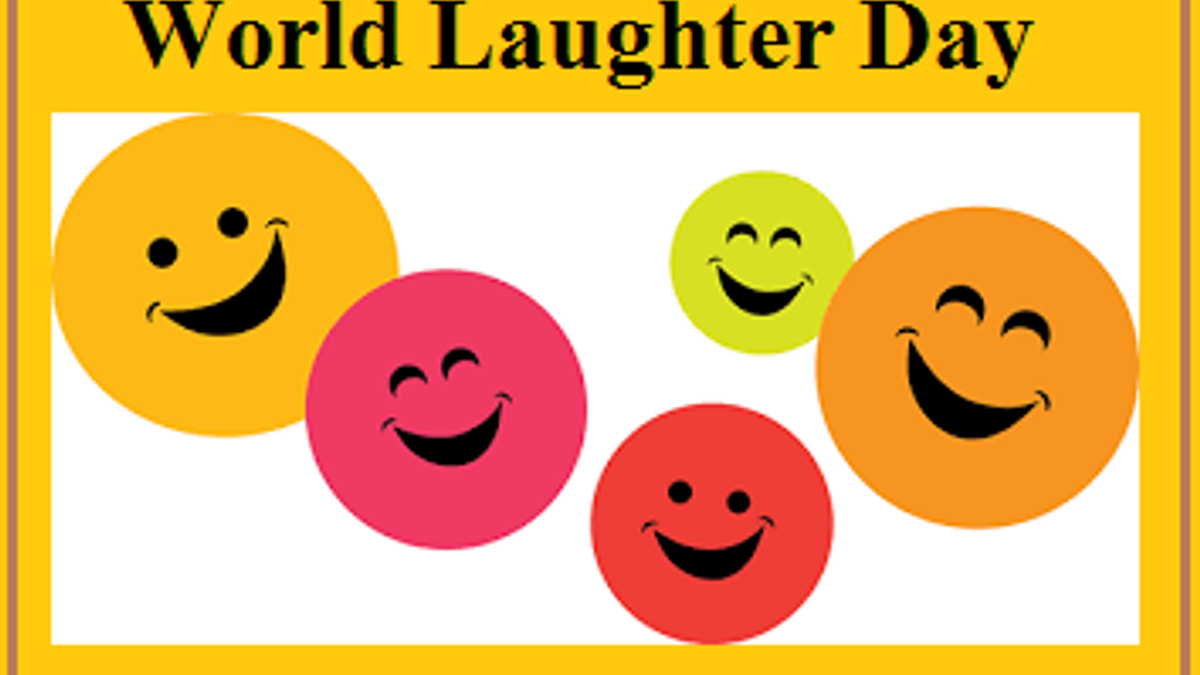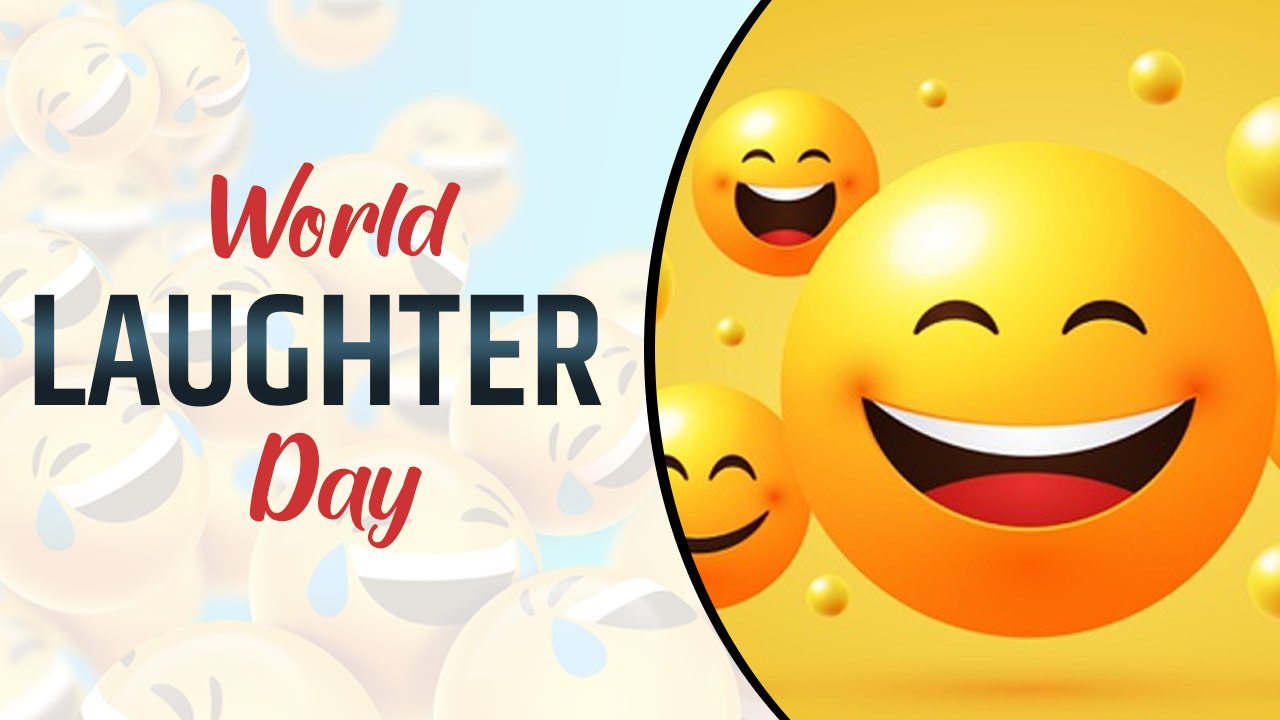World Laughter Day/First Day of Mental Health Awareness Month
World Laughter Day/First Day of Mental Health Awareness Month: It’s a powerful pairing, isn’t it? This convergence highlights the incredible link between our mental wellbeing and the simple act of laughter. We’ll explore the science behind laughter’s therapeutic effects, discover practical ways to incorporate more joy into your daily life, and understand how shared laughter strengthens our social connections.
Get ready to chuckle your way to better mental health!
This exploration delves into the physiological and psychological benefits of laughter, examining its role as a stress reducer and its potential in managing anxiety and depression. We’ll look at how laughter therapy compares to other stress reduction techniques and discuss the importance of social connection in fostering mental wellbeing. The piece also offers practical strategies for promoting laughter in various settings, from the workplace to the family home, and provides resources for continuing this journey towards better mental health.
The Convergence of Laughter and Mental Wellbeing
World Laughter Day, celebrated annually on May 1st, and the beginning of Mental Health Awareness Month, converge to highlight the profound connection between laughter and mental wellbeing. This synergistic relationship underscores the importance of incorporating laughter into our daily lives to promote mental health and resilience.
Physiological and Psychological Benefits of Laughter
Laughter triggers a cascade of positive physiological and psychological effects. Physiologically, it stimulates the release of endorphins, natural mood boosters that alleviate pain and reduce stress. It also improves cardiovascular health by lowering blood pressure and increasing heart rate variability. Psychologically, laughter enhances mood, reduces anxiety, and promotes a sense of optimism and resilience. It fosters positive emotions, improves cognitive function, and strengthens the immune system.
The Synergistic Relationship Between World Laughter Day and Mental Health Awareness Month
The juxtaposition of World Laughter Day and Mental Health Awareness Month serves as a powerful reminder of the interconnectedness of physical and mental health. Both initiatives emphasize the importance of proactive measures to improve overall wellbeing. By celebrating laughter on World Laughter Day, we set a positive tone for the month dedicated to raising awareness about mental health issues and promoting accessible support systems.
Incorporating Laughter into Daily Routines
Integrating laughter into daily life is surprisingly simple. Here are a few practical examples:
- Watch a funny movie or TV show.
- Spend time with loved ones who make you laugh.
- Listen to a comedy podcast or audiobook.
- Read humorous books or comics.
- Engage in playful activities, like playing games or dancing.
Laughter as a Stress Reducer
Stress is a pervasive issue impacting mental health. Laughter provides a potent antidote by influencing the body’s stress response.
Laughter’s Role in Reducing Stress Hormones
Laughter reduces levels of cortisol, the primary stress hormone. This reduction contributes to a sense of calm and relaxation, lessening the negative physical and psychological effects of chronic stress. Studies have shown a direct correlation between increased laughter and decreased cortisol levels, improving overall stress management.
A Guided Laughter Exercise
This short exercise can be performed anywhere, anytime:
- Find a comfortable position and close your eyes.
- Begin by taking three deep breaths, inhaling slowly and exhaling fully.
- Start with gentle chuckles, gradually increasing the intensity to hearty laughter. Allow the laughter to come naturally, without self-consciousness.
- Continue for 2-3 minutes, noticing the physical sensations of laughter in your body.
- Conclude with a few more deep breaths, savoring the sense of relaxation and wellbeing.
Comparing Laughter Therapy with Other Stress Reduction Techniques
Laughter therapy complements other stress-reduction techniques like meditation, yoga, and deep breathing exercises. While these methods focus on relaxation and mindfulness, laughter therapy actively engages positive emotions, providing a holistic approach to stress management. It’s often more accessible and engaging for individuals who find traditional relaxation techniques challenging.
The Importance of Social Connection and Laughter: World Laughter Day/first Day Of Mental Health Awareness Month
Social connection is fundamental to mental wellbeing. Shared laughter significantly strengthens social bonds and combats the detrimental effects of isolation.
The Impact of Social Isolation on Mental Health
Social isolation increases the risk of depression, anxiety, and other mental health issues. Loneliness can lead to feelings of worthlessness, hopelessness, and increased stress levels. Shared experiences, especially those involving laughter, are crucial for building social connections and combating these negative effects.
A Scenario Illustrating the Positive Effects of Group Laughter
Imagine a group of friends gathered for a game night. As they play, jokes are shared, silly moments occur, and spontaneous laughter erupts. This shared laughter fosters a sense of camaraderie, strengthens bonds, and creates positive memories. The shared experience transcends the game itself, building a stronger sense of belonging and connection.
Encouraging Laughter and Social Interaction
Communities can promote laughter and social interaction through various initiatives:
- Organizing community laughter clubs or yoga laughter sessions.
- Hosting comedy nights or open mic events.
- Creating opportunities for shared activities and social gatherings.
- Promoting inclusive environments where individuals feel comfortable expressing themselves and sharing laughter.
Laughter and Mental Health Conditions
While not a replacement for professional treatment, laughter can be a valuable complementary tool in managing symptoms of various mental health conditions.
Laughter as a Tool in Managing Anxiety and Depression, World laughter day/first day of mental health awareness month
Laughter can alleviate anxiety by reducing stress hormones and promoting a sense of calm. For depression, laughter can temporarily lift mood, providing a brief respite from negative thoughts and feelings. It encourages the release of endorphins, which can help to improve overall mood and energy levels.
Incorporating Laughter into Therapeutic Interventions

Laughter therapy can be incorporated into various therapeutic settings. Therapists might use humor to build rapport with clients, create a safe and comfortable environment, and encourage self-expression. Humorous activities and exercises can be integrated into therapy sessions to promote relaxation, reduce anxiety, and improve mood.
Limitations of Laughter as a Sole Treatment
It’s crucial to understand that laughter is not a cure for mental health conditions. It serves as a valuable complementary tool, but professional help from mental health professionals is essential for diagnosis and treatment. Laughter therapy should be integrated as part of a comprehensive treatment plan, not as a standalone solution.
Promoting Laughter and Mental Wellbeing Initiatives
Individuals and communities can actively promote laughter and mental wellbeing through various initiatives.
Practical Steps to Cultivate More Laughter
Here are some practical steps to integrate more laughter into your life:
- Surround yourself with positive and humorous people.
- Watch funny videos or movies.
- Read humorous books or comics.
- Practice gratitude and focus on positive aspects of life.
- Engage in activities that bring you joy and laughter.
Promoting World Laughter Day and Mental Health Awareness Month
Communities can promote these days by organizing laughter yoga sessions, comedy shows, or awareness campaigns. Schools can incorporate laughter-based activities into their curriculum. Workplaces can organize team-building events focused on humor and fun.
Creating Engaging and Accessible Resources
Creating accessible resources like brochures, social media campaigns, and online videos can raise awareness and provide practical tips for incorporating laughter into daily life. These resources should be designed to be inclusive and appealing to a broad audience.
The Science Behind Laughter’s Therapeutic Effects
The therapeutic effects of laughter are supported by scientific research exploring its neurological and biochemical impacts.
Choosing a career path can be tough! If you’re considering nursing, you might want to check out the salary comparisons between wound care and mental health nursing – wound care nurse salary bsn vs mental health bsn salary is a great resource for that. This is especially relevant given the increasing focus on mental health, a field where innovation is crucial.
Speaking of innovation, the Yale Center on Policy Innovation for Family Mental Health is doing important work to improve access to care and support for families facing mental health challenges. Ultimately, both fields offer rewarding careers with significant impact.
Neurological Pathways and Brain Chemistry

Laughter activates multiple areas of the brain, including those associated with reward, emotion regulation, and social cognition. It triggers the release of dopamine and serotonin, neurotransmitters that contribute to feelings of pleasure and wellbeing. These neurological changes contribute to the mood-boosting and stress-reducing effects of laughter.
Research Supporting Laughter’s Therapeutic Benefits
Numerous studies have demonstrated the positive effects of laughter on various mental health conditions. Research indicates that laughter therapy can reduce anxiety, improve mood, and enhance social interaction in individuals with depression, anxiety disorders, and other mental health challenges. The specific benefits can vary depending on the individual and the context of the intervention.
Effectiveness of Laughter Therapy Across Demographics
While the benefits of laughter are generally applicable across demographics, the specific impact can vary depending on age, cultural background, and individual personality. For instance, children might respond differently to laughter-based interventions compared to older adults. Culturally sensitive approaches are necessary to ensure the effectiveness and inclusivity of laughter therapy programs.
Creating a Culture of Laughter
Promoting laughter requires a conscious effort to integrate it into various settings.
Encouraging Laughter in the Workplace

Workplaces can foster a culture of laughter through team-building activities, humor-based training sessions, and designated “laughter breaks.” Creating a supportive and inclusive environment where employees feel comfortable expressing themselves and sharing laughter is crucial for improving morale and reducing stress.
Implementing Laughter-Based Activities in Educational Settings
Schools can incorporate laughter-based activities into their curriculum through storytelling, drama, and games. Creating a playful and positive learning environment can reduce stress, enhance engagement, and improve student wellbeing.
Choosing a career path after getting a BSN can be tough! If you’re considering nursing, you might want to check out the salary comparison between wound care and mental health nursing: wound care nurse salary bsn vs mental health bsn salary. This is especially relevant given the growing need for mental health professionals. Speaking of which, improving family mental health is crucial, and organizations like the Yale Center on Policy Innovation for Family Mental Health are working hard to address these challenges through policy changes and innovative solutions.
Ultimately, both fields offer rewarding careers with the potential for significant impact.
Integrating Laughter into Family Routines
Families can cultivate a culture of laughter through shared activities like playing games, watching funny movies, or telling jokes. Regular family time focused on fun and laughter strengthens bonds and creates positive memories, promoting mental wellbeing for all family members.
Ultimately, World Laughter Day and the start of Mental Health Awareness Month remind us that prioritizing our mental health is crucial. While laughter isn’t a cure-all, its power to reduce stress, foster connection, and improve mood is undeniable. By actively cultivating laughter in our lives – whether through shared jokes, engaging activities, or mindful laughter exercises – we can significantly contribute to our overall wellbeing and build a more joyful and supportive community.
Let’s embrace the power of laughter and make every day a little brighter.
Share this content:
